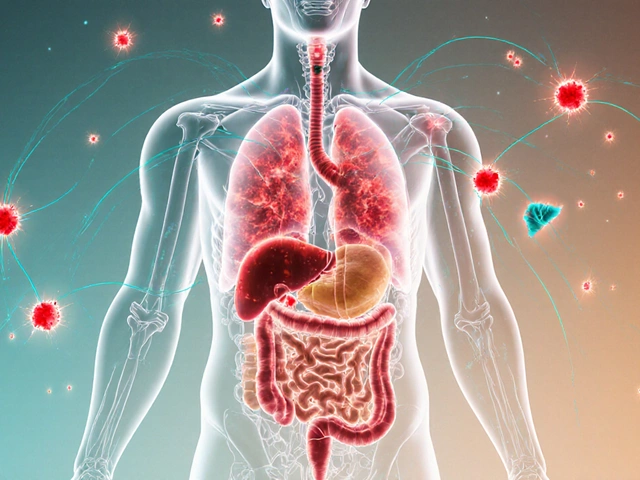- Home
- ::
- What Herb Repairs the Liver? Exploring Natural Liver Helpers

What Herb Repairs the Liver? Exploring Natural Liver Helpers
The liver has a tough job, handling everything from breaking down what we eat to clearing out stuff our bodies don’t need. And yeah, it can take a beating from things like too much junk food, alcohol, or certain medicines. So, it’s no surprise people look for ways to help it recover.
If you’re wondering what herb actually repairs the liver, milk thistle is the one you keep hearing about, and for good reason. This purple-flowered plant has a compound called silymarin that researchers have put under the microscope. Silymarin seems to help shield liver cells and might even help them regenerate after damage.
But is milk thistle a magic fix? Not exactly. It’s useful, and a bunch of real studies suggest it can help ease certain liver problems, especially if you catch damage early. Some people even use it after big nights out or during medication changes, hoping to give their liver an assist. Of course, drinking less alcohol and cutting back on fatty foods is still the main move for keeping your liver happy.
- Understanding How the Liver Repairs Itself
- Milk Thistle: The Popular Liver Hero
- Other Herbs Worth Knowing About
- Tips for Taking Liver-Supporting Herbs Safely
Understanding How the Liver Repairs Itself
The liver is kind of a champion when it comes to healing. Most organs can’t bounce back the way it can. Lose even half your liver, and as long as the rest is healthy, that tissue can actually regrow. That’s why surgeons can take a chunk out for transplant, and both the donor and the patient have a working liver after surgery.
The secret is in how its cells, called hepatocytes, work. These cells can split and multiply when they sense damage, whether it’s from too many drinks, a bad case of hepatitis, or a greasy diet. But, the liver isn’t magic—keep up the abuse, and scar tissue can build up. That’s when fixing things gets a lot harder.
Check out this quote from the American Liver Foundation:
“The liver is resilient and capable of regenerating itself, but its ability to recover depends greatly on reducing or removing whatever is causing the harm.”
So, what does this look like day-to-day? A healthy liver can push out new, healthy tissue in just a few weeks after an injury. But things like ongoing alcohol consumption, eating too much processed food, or certain toxins can slow, or even stop, repair. Healthy choices give your body the upper hand.
- If you want your liver to repair itself, try to cut down on alcohol and fatty foods.
- Keep your weight in check—fatty liver from obesity or diabetes is a real thing.
- Watch your medication and supplement use; some can be surprisingly hard on your liver.
- Be smart about viral infections, like hepatitis—get tested and vaccinated when possible.
Supporting your liver isn’t just about grabbing a bottle of milk thistle or any other supplement. Cutting out what’s hurting your liver is the first step, and it’s also the part you’re totally in control of, starting right now.
Milk Thistle: The Popular Liver Hero
If you search "milk thistle" and liver, you’ll see a flood of stories and supplement ads. But why is this herb such a go-to for folks wanting to help their liver?
First up, milk thistle’s main claim to fame comes from a compound called silymarin. This plant extract has been tested a bunch in labs and on people. What makes silymarin special is that it acts as an antioxidant—it helps block damage from stuff like alcohol, pollution, and even some medicines that can make your liver work overtime.
Here’s a straight-up quote from the National Center for Complementary and Integrative Health:
“There is some evidence that milk thistle may help reduce liver inflammation and damage in people with certain liver conditions, like hepatitis and cirrhosis, but results are mixed.”
That pretty much sums up where the science is at right now. There’s hope, but no miracle cure. Still, a few interesting stats show what researchers have found so far:
| Study Group | Result |
|---|---|
| People with hepatitis C (2019 study) | Less liver damage in those using milk thistle vs. placebo |
| Heavy alcohol users (2021 research review) | Lower liver enzyme levels with milk thistle supplements |
| People with fatty liver disease (2023 report) | Mild improvement in liver function after 3 months |
Most folks take milk thistle in capsule or tablet form, but you’ll also see teas and tinctures. Experts usually suggest sticking to standardized pills—look for ones with 70–80% silymarin for the most reliable kick.
- Start with what's listed on the label—usually around 150 mg two to three times daily unless your doctor says otherwise.
- Watch out for possible side effects like mild stomach upset or diarrhea. Nothing scary, but not fun either.
- If you’re pregnant, have allergies to ragweed, or take meds that thin your blood, ask a doctor first.
Milk thistle probably won’t turn back years of hard living overnight, but for most healthy people, it’s a gentle extra boost for your liver routine.

Other Herbs Worth Knowing About
While milk thistle gets most of the attention for liver help, it’s not the only herb that deserves a spot on your kitchen shelf. Let’s talk about a few others that have shown promise in scientific studies or have been trusted in traditional medicine for years.
- Turmeric: This bright yellow root is more than just a curry ingredient. The compound curcumin in turmeric has anti-inflammatory properties and has popped up in studies looking at liver protection. People with fatty liver or mild liver inflammation sometimes add turmeric to their diets because it may slow damage or help with repair over time. Just be careful with the dosage—too much turmeric can mess with how your body handles iron and some drugs.
- Dandelion root: Forget about these weeds being just a backyard headache. In folk medicine, dandelion root tea is a classic for "detox." Some animal studies hint that it might ease stress on the liver and help bile flow better, making it easier for your liver to do its job. But, there isn’t a ton of hard evidence from big human studies yet.
- Artichoke leaf: This one’s not just for pizza topping. Artichoke extract is used in some European supplements to help protect liver cells. The main active compound, cynarin, appears to help the liver make more bile, which is important for digesting fats. Some trials have seen people with mild liver problems benefit from artichoke, but it’s not a miracle cure. Don’t expect it to undo years of liver stress overnight.
- Schisandra: This berry is in a bunch of Asian traditional medicines. Some early research suggests schisandra can help the liver handle toxins better. You’ll find it in some blends aimed at liver support, often paired with milk thistle or turmeric.
| Herb | Main Compound | What It Does |
|---|---|---|
| Turmeric | Curcumin | Reduces inflammation, may help with liver repair |
| Dandelion Root | Sesquiterpene lactones | Supports bile flow, possible detox effect |
| Artichoke Leaf | Cynarin | Stimulates bile, supports liver cell health |
| Schisandra | Lignans | Improves how the liver processes toxins |
With any of these herbs, it’s smart to start small, watch out for allergies, and don’t go overboard—herbs can interact with meds or other conditions. Want to give your liver a real break? Cut back on drinking, limit super-processed foods, and keep moving. Herbs can support good habits, but they can’t replace them.
Tips for Taking Liver-Supporting Herbs Safely
It’s pretty tempting to believe that if a little is good, a lot must be better. But with herbs for liver health, it just doesn’t work that way. There are a few basic things you should keep in mind if you want to try out milk thistle or any other herbal supplement for your liver.
- Start with trusted brands. Herbal supplements aren’t all created the same. Some products can have weird fillers or not even contain what the label claims. Look for brands that are tested by third parties (like USP or NSF labels).
- Watch your dose. Even though herbs are "natural,” that doesn’t mean they’re always safe in huge amounts. Most studies on milk thistle, for example, use between 200-400mg silymarin per day. More isn’t always better, and mega doses can mess with other medications.
- Talk to your doctor first. If you already have a liver condition, are on regular meds (especially for liver, blood sugar, or cholesterol), or are pregnant, it’s smart to check with your doctor before starting any new supplement. Herbs can interact with your meds or affect how your body handles them.
- Stick with simple, one-ingredient supplements. Combo liver detox blends or teas can throw in all kinds of other herbs and extras that aren’t well studied. If you’re going to try milk thistle, just use milk thistle—makes it way easier to spot if it’s actually helping or causing any weirdness.
- Be patient but watchful. Milk thistle and other liver herbs don’t work overnight. You might need to take them for a few weeks before you feel anything, if you notice anything at all. If you suddenly start getting nausea, itchy skin, or stomach pain, stop right away and talk to your doc.
At the end of the day, these herbs are more of a support system and not a fix-all. They work best alongside good habits—like less booze, more veggies, and smarter food choices. That’s how you keep your liver around and working for the long haul.

 Health and Wellness
Health and Wellness





Write a comment